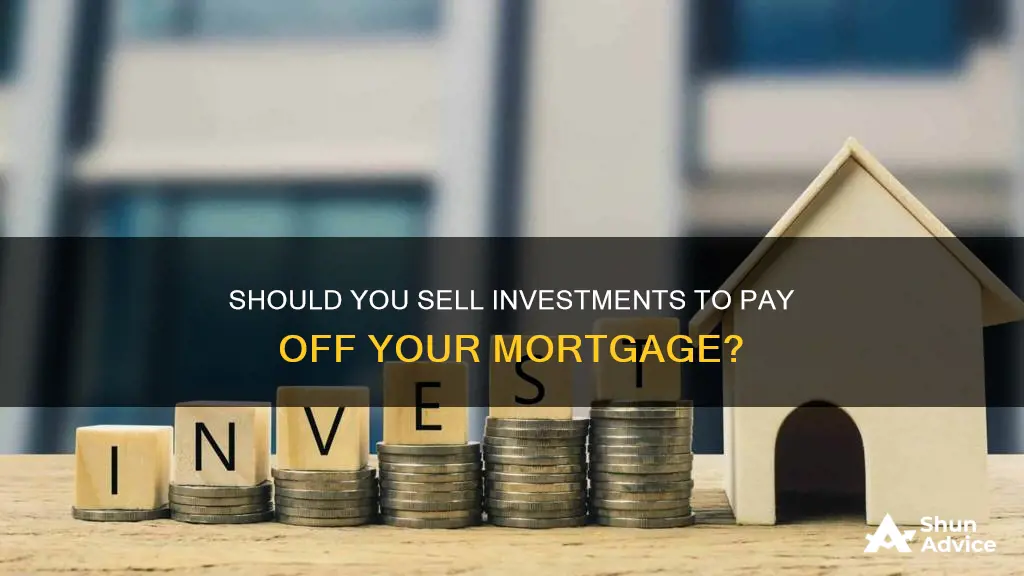
Whether to sell investments to pay off a mortgage depends on an individual's financial situation and their risk tolerance. While some people may feel liberated by paying off their mortgage, others may want to keep their money invested in the market to benefit from higher returns.
Paying off a mortgage early can save thousands of dollars in interest payments and provide peace of mind by eliminating a large monthly expense. On the other hand, investing extra cash instead of paying off a mortgage early can potentially lead to higher returns, increased liquidity, and tax benefits.
It's important to consider factors such as the interest rate on the mortgage, the potential returns on investments, tax implications, and an individual's financial goals and risk tolerance when making this decision. Consulting a financial advisor can help individuals make an informed choice that aligns with their unique circumstances.
| Characteristics | Values |
|---|---|
| Should I sell investments to pay off mortgage? | Depends on your financial situation, the interest rate of the loan, and how close you are to retirement |
| Interest cost saved by paying off mortgage early | Varies depending on the interest rate and the number of years left on the mortgage |
| Investment gains | Varies depending on the average rate of return and the number of years invested |
| Opportunity cost | The potential gains from investing the money instead of paying off the mortgage |
| Tax implications | Capital gains tax on investment profits; tax deductions for mortgage interest |
| Peace of mind | Being debt-free can reduce stress and provide financial security |
| Building equity | Paying off the mortgage faster increases home equity, which can be leveraged for refinancing or a home equity line of credit |
| Liquidity | Investments are more liquid than property and can be easily sold to access cash |
| Risk | The stock market has higher volatility and risk of losses compared to the housing market |
What You'll Learn
- Weigh up the interest saved on your mortgage vs the returns on your investments
- Consider the tax implications of selling investments
- Assess the risk of investing in the stock market vs paying off your mortgage
- Think about the opportunity cost of using your investments to pay off your mortgage
- Explore alternative options, such as a stock-secured loan or a portfolio line of credit

Weigh up the interest saved on your mortgage vs the returns on your investments
When deciding whether to sell investments to pay off your mortgage, it's important to weigh up the interest saved on your mortgage against the potential returns on your investments. This decision involves a number of factors, including your mortgage rate, risk tolerance, expected investment returns, and financial goals.
Interest saved on your mortgage
Paying off your mortgage early can result in significant interest savings. For example, consider a 30-year mortgage of $200,000 with a fixed rate of 4.5%. By contributing an extra $300 per month, you could save $67,816 in interest over the life of the loan. Moreover, paying off your mortgage early can provide peace of mind, increase your home equity, and free up money in your budget.
Returns on your investments
On the other hand, investing your money can potentially generate higher returns compared to the interest cost of your mortgage. Historically, the stock market has offered higher average returns than mortgage interest rates. For instance, the S&P 500 has returned an average of 10% to 11% annually since its inception. By investing in the market, you may benefit from higher returns, liquidity, and the potential for employer-matched contributions in retirement accounts.
Key considerations
When deciding between paying off your mortgage early or investing, it's essential to consider your risk tolerance and financial goals. Investing in the market carries higher risk but also offers the potential for more substantial gains. In contrast, paying off your mortgage is generally considered the safer option, providing a guaranteed return on your investment. Additionally, your mortgage interest rate plays a crucial role in your decision-making. If you have a low mortgage rate, investing may be more advantageous, whereas a higher mortgage rate may favour early repayment.
Expert recommendations
Financial experts generally advise against using your investments to pay down debt, unless it is high-interest debt such as credit card balances. They suggest that if the interest rate on your debt exceeds the potential returns on your investments, it may be prudent to prioritise debt repayment. However, it's important to consider the opportunity cost of withdrawing money from your investments and the potential impact on your long-term financial goals. Consulting a certified financial advisor can help you assess your unique financial situation and make an informed decision.
Sony: Invest Now or Miss Out?
You may want to see also

Consider the tax implications of selling investments
Selling investments to pay off your mortgage can have tax implications, such as capital gains tax, which you should carefully consider before making a decision.
In some cases, selling highly appreciated stocks to pay off your mortgage may not be the best option, as you could avoid capital gains tax by holding onto them. However, if your stocks are not appreciated, or if you have a windfall, you may need to weigh the trade-offs carefully.
If you sell investments that have experienced substantial growth, you may be subject to capital gains tax, which could eat into your profits. This is an important consideration, as you want to ensure that you maximise your returns and don't lose out financially.
Additionally, mortgage interest used to be tax-deductible, but recent changes in tax laws have limited this benefit. The standard deduction for married couples has increased, and the interest deduction is now capped at $750,000 of new mortgage debt, whereas previously it was $1,000,000. These changes mean that many taxpayers are likely to switch to the standard deduction and lose the tax benefit of a mortgage. As a result, the tax advantages of holding a mortgage have diminished, and paying it off early may be more appealing to some homeowners.
It is also worth noting that investment earnings are typically taxable, and the tax rates depend on the nature of the earnings, such as income or capital gains. Consulting a financial advisor or tax professional is recommended to fully understand the tax implications of selling your investments and ensure you make an informed decision.
REITs: Invest Now or Later?
You may want to see also

Assess the risk of investing in the stock market vs paying off your mortgage
Investing in the stock market and paying off your mortgage both come with their own set of risks and benefits. Here is an assessment of the two options:
Investing in the Stock Market:
Risks:
- Volatility and Risk of Loss: The stock market is subject to volatility, and there is a risk of significant losses. While the potential for high returns exists, there is also the possibility of losing a large portion, or even all, of your investment.
- Tax Implications: Investing in the stock market may trigger tax implications, such as capital gains taxes, which can eat into your returns.
- Costs and Fees: Investing often comes with costs, such as fees and taxes, which can impact your overall returns.
- Uncertainty: The stock market is unpredictable, and it is challenging to determine whether there will be a crash or a significant upward shift in the short term.
Benefits:
- Potential for Higher Returns: Historically, the stock market has offered higher average returns compared to mortgage rates. Investing in the stock market gives you the potential to earn more money than you would save by paying off your mortgage early.
- Liquidity: Stocks and other market investments offer better liquidity compared to property. It is generally easier and quicker to sell stocks and access your money if needed.
- Employer Match: If you invest in a retirement account and your employer offers a match, you can benefit from this additional free money, enhancing your overall returns.
- Wealth Building: Investing in the stock market allows you to build your future wealth. Over time, your investments can grow, setting you up for better financial stability in the long run.
Paying Off Your Mortgage:
Risks:
- Opportunity Cost: Paying off your mortgage early means you may be foregoing other investment opportunities with potentially higher returns.
- Wealth Tied Up in Property: Property is an illiquid asset, and accessing your wealth can be challenging and time-consuming. Selling a house and converting it into cash typically takes longer and is less flexible than selling stocks or other market investments.
- Loss of Tax Benefits: Paying off your mortgage early may result in losing potential tax benefits, such as deductions for mortgage interest payments, which can increase your tax refund and lower your taxable income.
- Prepayment Penalties: Depending on your lender, you may incur prepayment penalties if you pay off your mortgage too quickly, usually within the first few years of the loan.
Benefits:
- Interest Savings: Paying off your mortgage early can result in significant interest savings. You can save thousands or even tens of thousands of dollars in interest payments over the life of the loan.
- Peace of Mind: Being debt-free and owning your home outright can provide a sense of financial security and reduce stress.
- Building Equity: Paying down your mortgage faster allows you to build equity in your home more quickly, which can be leveraged for refinancing or home improvement projects.
- Freeing Up Funds: Once your mortgage is paid off, the money that was going towards monthly payments can be redirected to other financial goals, such as investing or personal expenses.
In conclusion, both options come with their own set of risks and benefits. The best choice depends on your financial situation, risk tolerance, and personal preferences. It may also be possible to adopt a hybrid approach, investing a portion of your funds while also making additional payments towards your mortgage. Consulting a financial advisor can help you make an informed decision that aligns with your goals and circumstances.
Best Places to Invest Cash Now
You may want to see also

Think about the opportunity cost of using your investments to pay off your mortgage
When deciding whether to sell investments to pay off your mortgage, it's important to consider the opportunity cost of using that money in this way. Opportunity cost refers to the value of the next best option you are giving up when making a decision. In this case, the opportunity cost is the potential investment gains you would be missing out on by selling your investments to pay off your mortgage.
For example, let's say you have a 30-year mortgage of $200,000 with a fixed interest rate of 4.5%. If you were to invest an extra $300 per month in an index fund that tracks the S&P 500 instead of putting that money towards your mortgage, you could potentially earn much higher returns. Historically, the S&P 500 has returned an average of 10% to 11% annually since its inception in 1926 through 2018. Even if we assume a more conservative average annual return of 8%, you would still end up with more money than if you had paid off your mortgage early.
On the other hand, if you have high-interest debt, such as credit card debt, it may be a better idea to use your investments to pay off that debt. Credit card interest rates can be very high, often exceeding the returns you would get from investments. For example, if you are paying 20% interest on credit card debt, you would need to make at least 20% on your investments just to cover the interest cost. In this case, the opportunity cost of not selling your investments to pay off the debt could be even higher.
Another factor to consider is the tax implications of selling your investments. If you sell investments at a profit, you may owe capital gains tax, which can be as high as 37% if you held the investments for less than a year. This could significantly reduce the amount of money you have available to pay off your mortgage or other debts.
Ultimately, the decision to sell investments to pay off your mortgage depends on a number of factors, including the interest rate on your mortgage, the potential returns on your investments, and your overall financial situation and goals. It's always a good idea to consult with a financial advisor before making any major financial decisions.
Investments of the 1950s: Where Did People Put Their Money?
You may want to see also

Explore alternative options, such as a stock-secured loan or a portfolio line of credit
If you're looking for an alternative to selling your investments to pay off your mortgage, you could consider a stock-secured loan or a portfolio line of credit. These options allow you to borrow money using your investments as collateral, without having to sell your positions. This can be especially useful if you have a large amount of money tied up in your portfolio and don't want to realise a loss or trigger capital gains tax.
A portfolio line of credit, also known as a margin loan, allows you to borrow against the value of your investment portfolio, typically at a low interest rate. The loan is collateralised by your stock positions, and you can use the money for anything you'd like, such as home improvements, paying off debt, or even buying more securities. The larger your portfolio, the more you'll be able to borrow, and you won't have a set repayment schedule, giving you flexibility.
One of the benefits of a portfolio line of credit is that it usually offers a lower interest rate compared to traditional loans or credit cards since your investments act as collateral. This also makes it easier to qualify for this type of loan. Additionally, you won't trigger the usual capital gains tax since you're borrowing against your positions without selling them.
However, there are some risks associated with portfolio lines of credit. The value of your investments can fluctuate with the market, so if your portfolio value declines below a certain threshold, you may be required to deposit additional funds or sell a portion of your portfolio to repay the loan. This is known as a margin call. It's important to carefully manage your borrowing to avoid this situation.
Another option is a securities-based line of credit (SBLOC), which is similar to a margin loan but offered through a bank. With an SBLOC, you can use your stocks or other securities as collateral to access a revolving line of credit. The amount you can borrow will depend on the value of your eligible securities, and you can use the funds for various purposes except for buying more securities or repaying margin loans.
SBLOCs offer quick access to cash and allow you to maintain your investment strategy without liquidating any holdings. They also provide flexibility, as you can usually access funds within a few days and repayment is flexible as long as the required collateral value is maintained.
However, it's important to be aware of the risks associated with SBLOCs. The value of your securities can fluctuate with the market, and if the value falls below a certain threshold, the bank may demand immediate repayment or require you to deposit additional cash or securities. Additionally, interest rates for SBLOCs are variable, so they can increase over time.
In conclusion, a stock-secured loan or a portfolio line of credit can be a useful alternative to selling your investments to pay off your mortgage. They provide access to cash without disrupting your investment strategy, offer flexible repayment options, and typically come with lower interest rates. However, it's important to carefully consider the risks involved, such as the potential for margin calls and variable interest rates, and ensure that you have a concrete repayment plan in place.
The Best Industry to Invest in Now
You may want to see also
Frequently asked questions
Paying off a mortgage early can save you thousands of dollars in interest payments. It can also give you peace of mind and free up funds to invest in other things.
Paying off a mortgage early could cut into savings and result in a loss of tax deductions. It may also be a poor investment decision if you could be earning a greater return on investments in riskier places, such as the stock market.
Investing in something like the stock market gives you the potential to earn a higher rate of return than you would save by paying off your mortgage early. It also increases your future wealth and gives you better asset liquidity.
Investing is riskier than paying off a mortgage, and there is a potential to lose money. Additionally, investing does not make your debt go away, and it can be costly.
Some alternatives include pausing contributions to your investments and redirecting that cash flow towards paying down high-interest debt, or using a line of credit from your investment portfolio, which means borrowing against your brokerage account.







